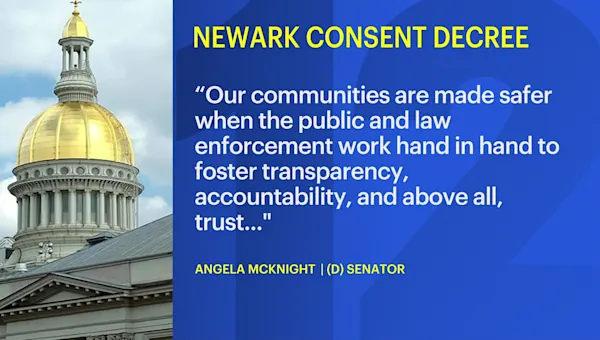As Newark’s decade-long police consent decree officially comes to a close, State Senator Angela V. McKnight (D-Hudson) is urging municipalities across New Jersey to strengthen community oversight of law enforcement. Highlighting the successes of Newark’s reforms, McKnight is advocating for wider adoption of Civilian Review Boards to maintain accountability and trust between police departments and the communities they serve.
The Newark consent decree, implemented more than ten years ago, was a landmark effort aimed at overhauling policing practices in the city. Over the course of the agreement, the department underwent significant reforms, including enhanced officer training, improved community engagement, and recruitment strategies designed to create a police force that reflects the city’s diverse population. These measures contributed to both reductions in violent crime and a more transparent law enforcement environment.
Senator McKnight emphasized that while the decree’s conclusion is a milestone, the work of sustaining progress must continue. “Our communities are made safer when the public and law enforcement work hand in hand to foster transparency, accountability, and above all, trust,” she stated. She credited Newark’s Civilian Review Board as a cornerstone of the city’s reforms, noting that it empowered residents to raise concerns, investigate allegations of misconduct, and hold officers accountable.
Civilian Review Boards, McKnight explained, offer a crucial mechanism for community oversight, giving residents a voice in policing decisions and ensuring law enforcement remains responsive to public needs. Her proposed legislation, S-2943, seeks to authorize municipalities and counties across New Jersey to establish their own boards, enabling more communities to benefit from this model of citizen-led oversight.
“The reality is that many cities face similar policing challenges, but lack the independent, community-centered forum necessary to build trust and strengthen public safety,” McKnight said. “By expanding these boards statewide, we can create a model of policing that is equitable, responsive, and truly reflective of the needs of the communities it serves.”
The call for broader oversight comes amid ongoing discussions about accountability and reform in law enforcement nationwide. Advocates argue that giving residents a structured role in monitoring police activities helps prevent misconduct, fosters dialogue, and strengthens community relations. Critics of oversight boards often cite concerns about potential interference in operational decisions, but McKnight and supporters assert that these boards enhance, rather than hinder, public safety by building trust and legitimacy.
Newark’s experience offers a roadmap for other cities. The city’s board has not only provided a forum for grievances but also contributed to measurable improvements in policing outcomes. McKnight’s legislation aims to replicate these benefits, ensuring that more communities across New Jersey have access to structured oversight mechanisms.
For those interested in the latest developments in law enforcement reform and statewide initiatives in policing accountability, Explore New Jersey Law & Order provides comprehensive coverage of legislation, municipal policies, and community advocacy efforts shaping the future of public safety.
As Newark transitions from a decade under the consent decree to a new phase of independent oversight, McKnight’s push for statewide Civilian Review Boards signals a broader commitment to transparency and community engagement. Expanding access to these boards promises to strengthen public trust, encourage collaboration between residents and law enforcement, and foster a more just and responsive policing model throughout New Jersey.












